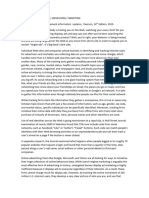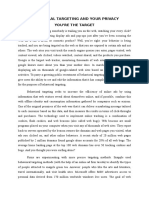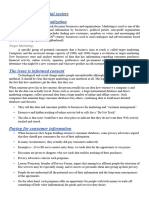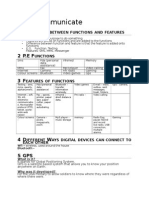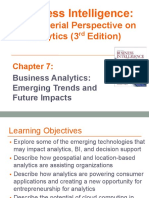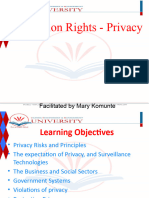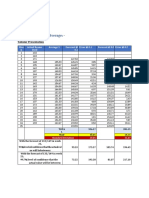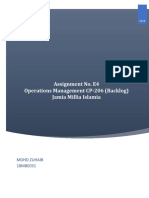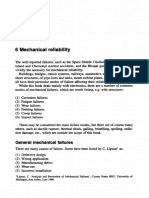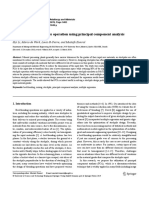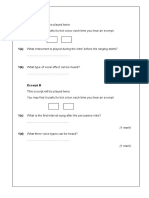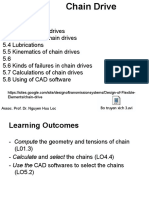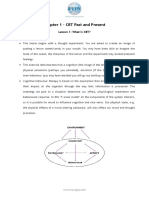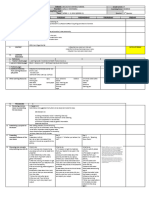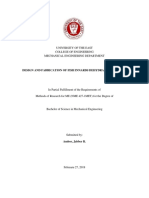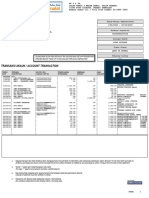MBA (E) CP-207
MBA (Executive) Programme II Semester Examination 2020
Information System for Management
End-Semester-Exam-Assignment-4
Name: - Majid Ahmad
Roll No: - 19MBE025
Case Study Questions:
1. Does Location Tracking Threaten Privacy? Give your opinion in your own words.
Answer:
The use of location tracking systems described in the opening case shows that technology can be a
double-edged sword. It can be the source of many benefits, and it can also create new opportunities
for breaking the law or taking benefits away from others.
The question calls attention to important points raised by this case. The D.C. public school system
faced a real problem in trying to make sure its drivers were transporting children safely and promptly
to school. Location tracking technology provided a solution, but it also introduced the possibility that
information about the people or vehicles S3 tracked could be used for the wrong purpose.
Location tracking technology had a similar impact for designer Lauren Scott’s children’s clothing
business.
This solution created what we call an “ethical dilemma,” pitting the legitimate need to know what drivers
of school buses were doing with the fear that such information could be used to threaten individual
privacy.
Another ethical dilemma might occur if you were implementing a new information system that reduced
labor costs and eliminated employees’ jobs.
We need to be aware of the negative impacts of information systems and we need to balance the
negative consequences with the positive ones
Ethics refers to the principles of right and wrong that individuals, acting as free moral agents, use to
make choices to guide their behaviors. Information systems raise new ethical questions for both
individuals and societies because they create opportunities for intense social change, and thus
threaten existing distributions of power, money, rights, and obligations. Like other technologies, such
as steam engines, electricity, the telephone, and the radio, information technology can be used to
achieve social progress, but it can also be used to commit crimes and threaten cherished social values.
The development of information technology will produce benefits for many and costs for others.
1
�How people track you
People can track your location through your devices. If you use a computer, your IP address can
narrow down your location. When you are on a mobile device, such as a cell phone or tablet,
individuals can track your location via GPS or through a combination of cellular tower data, Wi-Fi
signals, and Bluetooth beacons.
Many of the apps you use (and the companies behind them) also track you. In fact, more than 1,000
apps, including Yelp, Foursquare, Google Maps, Uber, MapMyRun, Tinder, and Facebook, use
location tracking services. And some of these companies continue to track you even if you have
location data turned off in the app’s settings. For example, Facebook still uses IP address and other
data such as your profile city and your check-ins to target ads to you.
There are other ways to track people but we will not go through this answer.
What kind of information does location tracking reveal?
By looking at your location data, anyone can discover the following:
• Where you sleep, and thus where you live
• Your income level, based on where you live
• Where you work, and what kind of work you do
• What stores you frequent
• The route you take to work
• If you regularly go to a gym
• When you take a vacation, and where you stay
Because this kind of data gives marketing companies such microscopic insights into consumer
behavior, many businesses are willing to pay big money for it. In fact, sales of geotargeted mobile ads
are expected to reach $38.7 billion by 2022.
How burglars and stalkers can use geo tracking to target you
In addition to making you a target for ads, geo tracking can put you at physical risk. One notable
example of this happening is when Strata, a fitness-tracking app, posted a heat map of its users across
the world, with individual users’ exercise routes highlighted. Unfortunately, the heat map revealed the
activities of US soldiers exercising at secret bases in the Middle East—essentially blowing their cover.
Even if you’re not a soldier, location tracking can make you more vulnerable to attacks. Nowadays,
we all walk around with our devices in our pockets, in our purses, or in our backpacks. And even
though we’re not touching them, they’re recording where we travel and when. By cross-referencing a
map of your activity with information about you garnered from a simple Google search, people with
bad intentions can access a wealth of data about every element of your daily life.
2
�The availability of this kind of detailed information puts you at risk for stalking or harassment. For
example, if you visit the same pastry shop every Sunday morning, then someone who is tracking your
movements will be able to identify the best time and place to confront you. Importantly, it also tells
thieves where you won’t be every Sunday morning, thus notifying them of the best time to rob you.
In addition to that the POLICE, the government and other institutions also pose privacy threatens
based on location tracking. With the introduction of Artificial Intelligence, image searching programs
and all other analytics option, it has become an option to become lethal weapon that could put into
good/bad use depending on the nature of the use.
Conclusion
Given the vast and growing threats to consumers’ data, it seems that privacy concerns around online
behavioral tracking remain there.
GPS and behavioural tracking technologies make today’s smart devices and browsers convenient and
fun to use. However, the risks to users’ privacy should not be neglected. People should be encouraged
to deactivate location services whenever they aren’t required.
Sure, we have been given ultimate ease and freedom with the advancement of Information Services,
but the use of these online advancement comes with a price. The only solution remains to be vigilant
always and have complete knowledge in whatever you do. Read those terms and conditions and don’t
blindly give consent to anything.
3
�Case Study Questions:
2. What was the need of this Merger, why these two big giants merged and who will be
benefited more from this merger? Explain in your own words.
Answer:
The primary purpose of mergers and acquisition is to enable airlines to eliminate duplicative operating
costs, therefore reducing their total costs on labor, service, and operations. It also enables the merging
firms to integrate their financial assets, facility, and technology.
As a result, airlines look for mergers and acquisitions in pursuit of both reducing operating costs and
maximizing revenue. For example, if two airlines with the most market overlap merge to one firm, the
cost saving from eliminating the duplicate operations would generate a significant cost saving effect.
Especially when the market demand is at the low, the need for mergers and acquisitions tends to
increase.
Experts say that the motivation behind industry mergers and acquisition is largely based on the airlines'
need for the combined market share at the integrating airlines' major hubs, because it can maximize
revenue. The motives for integration can include increasing revenues, improving management
efficiency and capital investment performance, and eliminating a competitor from the market. Airlines
also seek to merge with one another as a means to expand their networks. Additionally, airlines can
gain complementary routes, giving them the competitive advantage over their rivals.
Thus, the benefits of Merge & Acquisitions usually include the following
▪ Efficiency increase and cost reduction
▪ Market share increase
▪ Increased demand from an expanded network, which serves more city-pair markets. M&As
provide airlines with complementary routes, which result in a stronger platform.
▪ Revenue increase, e.g., capacity reduction in some markets after the merger provides an
opportunity to generate additional revenue from increased fares.
▪ Elimination of competition
▪ Access to airport slots and facilities
▪ Access to aircraft
▪ Better customer service
4
�Benefits of the America West and US Air merger are as below:
▪ Single-branded product offering a large network of worldwide destinations
▪ Financial stability with more than USD 2.5 billion in restricted and unrestricted cash
▪ The Star Alliance membership comprising of 16 airlines offering more than 15,000 daily flights
to 795 destinations in 139 countries at the time of the merger
▪ Dividend Miles frequent flyer program
▪ First class cabins on both domestic and international flights with advance seating assignments
and in-flight amenities
▪ Seventeen US Airways Clubs providing a quiet and comfortable place to work or relax.
The US Airways Group seems to have benefited from the merger. According to reports, overall the
financial performance of the US Airways Group improved since Q1 2006, except from Q4 2007 to Q1
2009 when the US economy faltered.
The airline’s improving profitability ratios indicate that the merger appears to be a success and that
the US Airways Group’s improving operating and financial performance will benefit not only its
investors but also its customers, who should eventually experience an improved service quality from
a better managed airline, which is on its way to financial sustainability.
Conclusion
While the weakening US economy from Q4 2007 to Q2 2009 has complicated the impact of the merger
on the US Airways Group’s operating and financial performance, overall the airline has managed to
turnaround the faltering performance of its predecessors. In view of the improving operating and
financial performance of the US Airways Group since America West acquired the bankrupt USAir in
September 2005, the merger is largely considered a success, even if the airline still needs to reduce
its reliance on debt and utilize its assets more efficiently to improve its profitability and financial
sustainability. Even investors agree that the merger is a success, rewarding the US Airways Group
with share prices that have outperformed the S&P 500 and XAL since the merger, except when the
US economy faltered. Moreover, US Airways Group’s share prices have outperformed its major
competitors for at least two years between 2010 and 2013.


